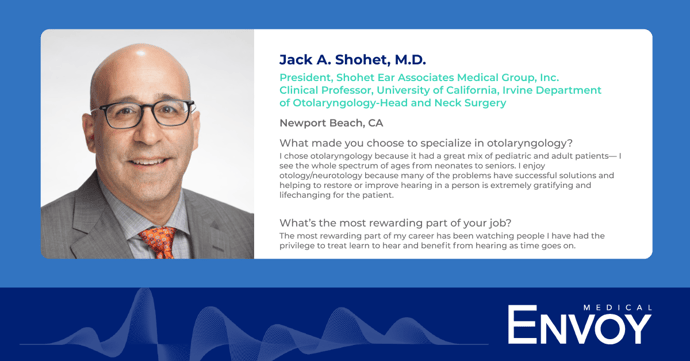Improving Hearing: the challenge of background noise
by Envoy Medical Staff Member, on January 31, 2022
The most common complaint from people living with hearing loss is difficulty hearing and understanding speech in background noise. Background noise is present in almost all situations, with the impact depending on the noise level and the individual's specific hearing loss. Shopping malls, stores, restaurants, bars, gyms, parties, sporting events, entertainment venues, and even ambient sounds in nature can all have varying degrees of loudness.
Background noise is defined as extraneous noise contamination sound measurements that cannot be separated from the desired signal.
Unfortunately, traditional hearing tests are not an accurate assessment of how much difficulty you are having in adverse listening environments. Speech in noise (SIN) testing, such as the QuickSIN test, is used to determine how much separation is needed between speech and background noise for you to understand.
In this test, you are given a sentence that you must repeat back to the audiologist, and as the test goes on with each sentence the background noise gets louder and louder. Even if you have normal hearing, you may have some trouble repeating sentences correctly as this test is carried out. The test is scored by determining how many words you got correct and subtracting it from a baseline score.
This test shows the audiologist how well you might be performing in a background noise situation by showing the signal-to-noise ratio which is a measure used in science and engineering that compares the level of the desired signal to the level of background noise. This information is then used to program your hearing device appropriately.
What makes it so difficult to hear?
First: It's important to understand how our brain processes speech. We all think we can do several things at a time, but our brain is designed to do one task at a time. This doesn’t mean you can’t several things at once, it just means you are not giving 100% to any of the tasks. So remember to give your full attention to listening.
Second: our brains are designed to listen to speech face to face, at a distance no greater than 6 feet, when you know the subject matter! WHAT!!!!! How often does that happen? Our brain typically focuses on the loudest signal in the room, which is why when you are in a restaurant, you can hear the man at the next table who is speaking loudly, but not the soft-spoken woman sitting next to you. How often are you speaking to a family member from another room, but you can’t hear or understand them? We typically have the poorest communication skills with those, we are most comfortable with. The better way is to walk in the room, get their attention and then start the conversation. How often are you in the kitchen washing dishes and someone starts speaking to your back? If they could get your attention; you could turn off the water and then the conversation can start. Is either of these scenarios realistic? Typically, no but they would make hearing and understanding most effective.
Third: most people have difficulty hearing in background noise, especially if they are over the age of 25! If you add a hearing loss on top of that, it becomes even more difficult.
How can you get help?
If you feel you are having more difficulty understanding in an adverse listening environment, make an appointment with an audiologist. Before scheduling the appointment, ask if they do tests like the QuickSIN, AzBio, or HINT(they all look at how we process speech in background noise.) If you have hearing loss and are not treating it, it’s worth the investment. If you are already a hearing aid user, ask them if they can verify if your hearing aids are appropriate for your hearing loss. This is done by performing a test called Real Ear verification. What is your Word Recognition Score (WRS)? If you have fair or poor word understanding, are you a candidate for a cochlear implant? Each of these factors contributes to your success with the technology you use to best treat your hearing loss and function to the best of your ability.
Advocacy: Your Help is Needed!
Envoy Medical Asks You to Urge Your Members of Congress to Support H.R. 1118, the Medicare Hearing Aid Coverage Act of 2021
Click here to request a letter template!



